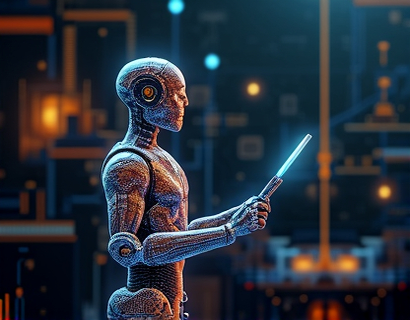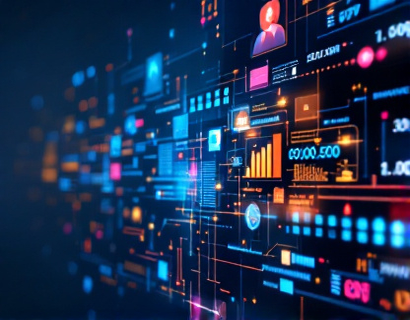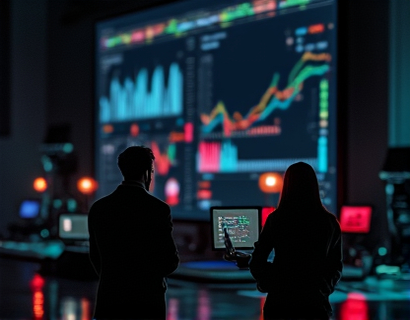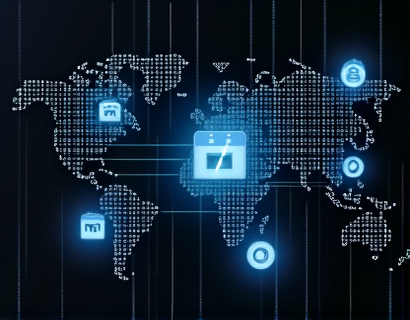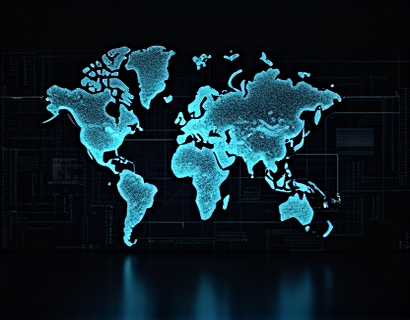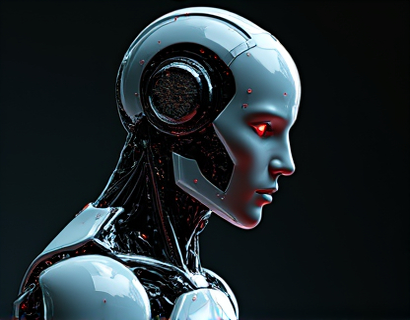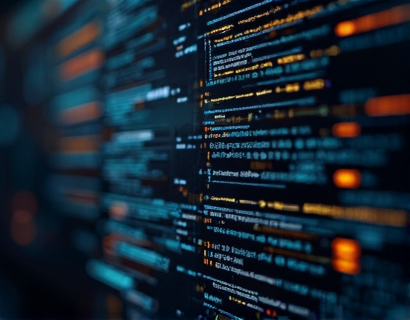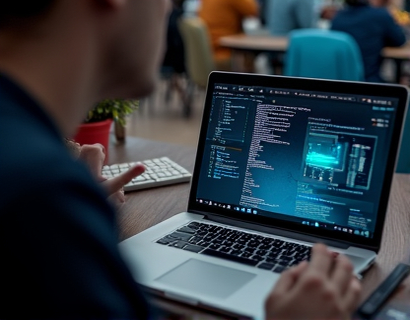Decentralized Productivity 2025: Maximizing Business Potential with AI and Crypto Synergy
The landscape of business productivity is undergoing a transformative shift, driven by the synergy between artificial intelligence (AI) and cryptocurrency. This convergence is giving rise to a new era of decentralized solutions that promise to revolutionize how businesses operate, connect, and innovate. In 2025, tech leaders and early adopters have the opportunity to harness this synergy through advanced platforms that integrate AI and crypto, offering unprecedented tools to enhance productivity and connectivity.
The foundation of this revolution lies in the unique properties of blockchain technology, which underpins cryptocurrency. Blockchain's decentralized nature ensures transparency, security, and immutability, making it an ideal framework for building trust and efficiency in business operations. When combined with AI, which excels in data analysis, automation, and predictive insights, the potential for innovation becomes immense. This article delves into how these technologies, when merged, can create a powerful ecosystem that redefines business productivity.
Understanding the Synergy Between AI and Cryptocurrency
To fully appreciate the impact of decentralized productivity in 2025, it's essential to understand the synergy between AI and cryptocurrency. AI's strength in processing and interpreting vast amounts of data can be significantly enhanced by the secure and transparent ledger provided by blockchain. This combination allows for the creation of decentralized applications (dApps) that leverage AI algorithms without the need for centralized control or intermediaries.
One of the key benefits of this synergy is the reduction of friction in business processes. Traditional centralized systems often suffer from bottlenecks due to single points of failure, high transaction costs, and limited scalability. Decentralized platforms eliminate these issues by distributing tasks and data across a network of nodes, ensuring that operations run smoothly and efficiently. AI algorithms can optimize these processes further by predicting and automating tasks, reducing human error, and enhancing decision-making.
Enhanced Security and Trust
Security is a paramount concern in any business environment, and the integration of AI and cryptocurrency addresses this need effectively. Blockchain's cryptographic techniques ensure that data is securely stored and transactions are immutable, reducing the risk of fraud and data breaches. AI enhances this security by continuously monitoring the network for anomalies and potential threats, providing real-time alerts and automated responses to mitigate risks.
Trust is another critical aspect where this synergy shines. In a decentralized system, all participants have access to the same transparent ledger, eliminating the need for intermediaries and reducing the potential for disputes. AI can further enhance trust by providing verifiable and auditable records of transactions and interactions, ensuring that all parties can confidently engage in business activities.
Improved Efficiency and Automation
Efficiency is a cornerstone of modern business, and the combination of AI and cryptocurrency offers significant improvements in this area. AI-driven automation can streamline repetitive and time-consuming tasks, allowing employees to focus on higher-value activities. Smart contracts, a key feature of blockchain technology, can automate complex agreements and transactions, executing them automatically when predefined conditions are met. This not only speeds up processes but also reduces the need for manual oversight and intervention.
Decentralized platforms can also optimize resource allocation and workflow management. AI algorithms can analyze data from various sources to identify bottlenecks and suggest optimal solutions. For instance, in supply chain management, AI can predict demand, optimize inventory levels, and ensure seamless coordination between suppliers and retailers. Cryptocurrency facilitates seamless and fast transactions, reducing the time and cost associated with traditional payment methods.
Innovative Business Models and Tokenomics
The convergence of AI and cryptocurrency is giving birth to innovative business models that leverage tokenomics. Tokens, which are digital assets built on blockchain, can represent various forms of value such as access to services, ownership in a project, or rewards for contributions. In a decentralized productivity ecosystem, tokens can be used to incentivize participation, reward performance, and facilitate peer-to-peer transactions.
For example, a platform could issue tokens to users who contribute valuable data or insights, which can then be used to access premium services or vote on community decisions. This token-based economy fosters a collaborative and motivated community, driving continuous improvement and innovation. AI can enhance this model by analyzing user behavior and preferences to tailor token distributions and incentives, ensuring maximum engagement and value creation.
Enhanced Connectivity and Collaboration
Connectivity and collaboration are essential for modern businesses, and decentralized platforms powered by AI and cryptocurrency offer unparalleled opportunities in this domain. These platforms enable seamless communication and collaboration across geographical boundaries, breaking down silos and fostering global partnerships. AI-driven tools can facilitate real-time translation, content creation, and data sharing, making collaboration more efficient and effective.
Decentralized social networks and communication tools built on blockchain can provide secure and private channels for businesses to connect and share information. AI can enhance these tools by analyzing communication patterns, identifying key influencers, and suggesting optimal collaboration strategies. This not only improves internal communication but also strengthens external partnerships and customer relationships.
Case Studies and Real-World Applications
Several organizations are already leveraging the synergy between AI and cryptocurrency to transform their operations. One notable example is a decentralized marketplaces platform that uses AI to match suppliers and buyers based on real-time demand and supply data. The platform operates on a blockchain, ensuring transparent and secure transactions, while AI optimizes the matching process to maximize efficiency and satisfaction.
Another example is a content creation and distribution platform that rewards creators with tokens based on AI-driven metrics such as engagement, quality, and relevance. This token economy incentivizes high-quality content and fosters a vibrant community of creators and consumers. AI algorithms curate and recommend content to users, enhancing the overall user experience and driving platform growth.
Challenges and Considerations
While the potential of decentralized productivity powered by AI and cryptocurrency is vast, there are several challenges and considerations that businesses must address. Regulatory uncertainty remains a significant hurdle, as governments worldwide are still grappling with how to regulate blockchain and cryptocurrency. Compliance with existing laws and the development of new regulations will be crucial for the widespread adoption of these technologies.
Technical complexity is another factor to consider. Implementing decentralized solutions requires a deep understanding of both AI and blockchain technologies, which can be a barrier for some organizations. Partnering with experienced developers and consultants can help navigate these complexities and ensure successful implementation.
Scalability is also a key consideration. While blockchain technology has made significant strides, it still faces challenges in handling high volumes of transactions with low latency. Advances in blockchain scalability solutions, such as layer 2 protocols and sharding, are addressing these issues, but businesses should stay informed about the latest developments to ensure their systems can scale effectively.
Future Outlook
Looking ahead, the integration of AI and cryptocurrency in decentralized productivity is poised for further growth and innovation. As more businesses recognize the benefits of this synergy, we can expect to see more sophisticated platforms and applications emerge. The development of interoperable blockchain networks will enhance connectivity and collaboration across different ecosystems, creating a more unified and efficient digital landscape.
AI advancements, particularly in areas like machine learning and natural language processing, will continue to enhance the capabilities of decentralized platforms. Predictive analytics, automated decision-making, and personalized user experiences will become more prevalent, driving greater adoption and value creation. The ongoing evolution of token economies and decentralized finance (DeFi) will also play a crucial role in shaping the future of business productivity.
In conclusion, the synergy between AI and cryptocurrency is revolutionizing business productivity in 2025. By leveraging the strengths of both technologies, organizations can achieve unprecedented levels of efficiency, security, and innovation. As tech leaders and early adopters, embracing this decentralized productivity ecosystem can provide a competitive edge and pave the way for a more connected and prosperous future.







